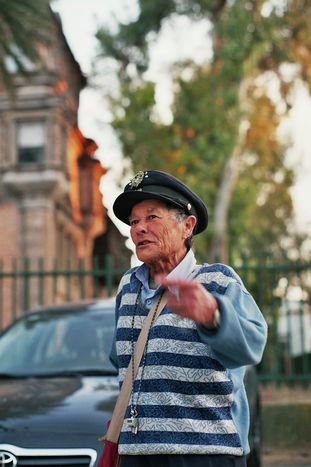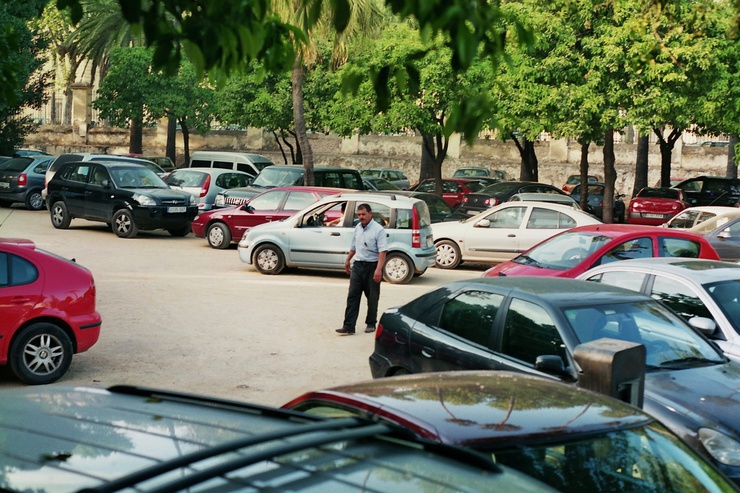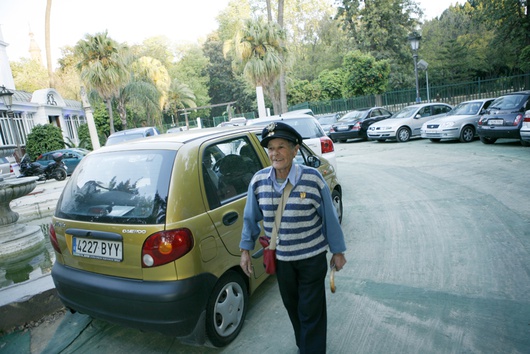
‘Vovis' versus ‘gorrillas’: tackling precarity in Seville
Published on
Translation by:
 Kate Stansfield
Kate Stansfield
They’ll find you parking spots for a little loose change. This form of begging in disguise allows the poorest members of society to make themselves a few hundred euros a month. Despite its large-scale growth in the Andalusian capital, the phenomenon is becoming a headache for the authorities
‘There on the right, park on the right, there’s a space!’ Wearing a blue shirt and carrying a book of tickets under his arm, M is the king of the parking zone alongside the Lopez de Vega theatre in Seville. It’s his zone. A regular, he recognises the locals, directs the newcomers and averages a few cents per car. The young man is not a police officer or a council employee, but a ‘Vovis’ (pronounced 'wbohbwies'), or ‘volunteer attendant’ ('voluntarios vigilantes'). These are mostly unemployed men over the age of forty who earn the majority of their income from this ‘job’ provided by the local association APM40 (association for the over-40s).

Specialised in the integration of disadvantaged social groups, the association is authorised by the council to let its members monitor a selection of Seville's parking spaces. It’s perhaps not a lucrative business, but has at least taken off in the area. Because whilst we may know Seville for its cathedral, oranges and easter week ('Semana Santa') processions, we can’t ignore the other side of the city’s endemic and recurrent economic precarity. Vovis like M are tolerated, but this is not the case for everyone. ‘And that’s the problem,’ explains Diego Jimenez, the council's spokesperson.
Parking cars with illegal attendants
A young Senegalese man, who we spot in a car park on the edge of the city, has a slightly grubby cap clamped onto his head. He waves his arms enthusiastically as he urges a vehicle to park in a space that was a touch on the narrow side and probably illegal. He is a ‘gorrilla’ (pronounced 'gorreeya'); the nickname comes from the word ‘gorra’, the cap worn by most to give themselves more credibility. Typically, they have no ID documents, and can be drug addicts, immigrants or other Sevillians living on the margins of society. Like the Vovis, they are also at large in all car parks to ‘help’ those lucky drivers find a parking space. Unlike the Vovis, it is done completely illegally and carried out for a small fee.
The ‘gorrilla’ phenomenon is very widespread in Madrid, Valencia and also the south of Spain. It’s thus become one of Seville's unfortunate specialities, something the Andalusian capital is finding hard to manage, especially with the number of those involved being extremely difficult to establish. With more or less effective coercive measures, the city is trying its best to stamp out a situation that is escaping its control. The latest of these is a municipal decree that will fine every ‘gorrilla’ caught in the act by the police. The penalty is 120 euros (£108), a substantial amount that begs the question of which penniless ‘gorrillas’ would be able to pay it…
APM40
The APM40 association was created in 1994 to help the socially disadvantaged - in particular those out of work and over 40 (hence its name) - when Spain was in the midst of a major economic crisis. APM40 has since continued to serve the most destitute, explains Rafael Esprajoso Espinola, association supervisor. To stop them becoming totally marginalised, he explains, ‘We supervise them and monitor them psychologically. We train them and most importantly we get them back on track by allowing them to earn a small amount of money for the services they provide.’
The Vovis have become the unarmed branch of Seville, officially charged with ‘cleansing’ the Andalusian capital of its illegal parking attendants
And to do this, why not allow them responsibility for the city’s parking areas, and specifically those that the ‘gorrillas’ are closing in on? Over the years, the Vovis (whose name is also a nod to the British ‘bobbies’) have become the unarmed branch of Seville, officially charged with ‘cleansing’ the Andalusian capital of its illegal parking attendants, who are quite aggressive and not very appreciated. If the ‘gorrillas’ swap their cap for the blue shirt of the association, even better.
‘Holding on’
Young M used to be a ‘gorrilla’. He tired of playing hide-and-seek with the police and dodging fines, becoming fed up with being on the wrong side of the fence. All that brought him barely ‘more than 200 to 300 euros (£180 - £270) a month’. Like the other Vovis, he is not employed by the association and only gets what the users of his service want to give him. What’s more, if the entry ticket is fixed at 60 cents (40p), half must then later be returned to APM40, which uses these profits to cover its running costs. A few hundred euros a month is not a great deal, but ‘it is always better than nothing’, adds Gaïdz, a young 30-year-old Albanian who came to Spain four years ago in search of the European dream. A jeweller specialising in gold, he is stacking up the temporary casual work and trying to make ends meet. His work in the car parks is a way of ‘holding on’, of not ‘going under completely’.
For Gabriel, who is in his eighties and has a ‘miniscule pension’ of which he prefers not to speak, this is the only way he can manage to pay his rent. ‘I would have been on the streets long ago, if it wasn’t for this work’, he adds. With the crisis, stresses Rafael Esprajoso Espinola, ‘many people are seeking help from the association,’ which manages some 300 volunteers. They are getting younger and younger, which is why APM40 has now opened its doors to those under forty, and to more and more foreigners, who comprise around 30% of their staff. ‘They are all here legally’, the association supervisor clarifies.
The council is working on it
 The ‘gorrillas’ continue to pour into certain areas of Seville. It’s consumer association is inundated with resident complaints every day. Road users vent their frustration daily on the internet. The result is that citizen groups like Bami Unido ('Bami United') - a neighbourhood association in the Bami quarter, which has been particularly affected by the phenomenon - are emerging. They demand harsher measures and even question the actions of the Vovis. It’s proof that the initiative might have demonstrated its usefulness, but lacks a unanimous backing, and for good reason.
The ‘gorrillas’ continue to pour into certain areas of Seville. It’s consumer association is inundated with resident complaints every day. Road users vent their frustration daily on the internet. The result is that citizen groups like Bami Unido ('Bami United') - a neighbourhood association in the Bami quarter, which has been particularly affected by the phenomenon - are emerging. They demand harsher measures and even question the actions of the Vovis. It’s proof that the initiative might have demonstrated its usefulness, but lacks a unanimous backing, and for good reason.
Despite the interest shown by the other Spanish towns to have adopted the model or by the European commission, who started to analyse its transfer to other EU countries in 1997, the legal framework within which the Vovis operate remains vague. Their presence is authorised but still not legalised, even if the ‘council is working on it,’ states Diego Jimenez. A lack of clarity is stirring up the resentment of car-drivers, often irritated by being forced to pay for car-parking spaces that are officially available and free. But as Maria whispers as she slips a coin into the hand of the young man who has just helped her park, ‘the Vovis are not a solution, just a lesser evil’.
Many thanks to Clara Fajardo from the cafebabel.com local team in Seville. Read more here
Translated from « Vovis » contre « gorillas » : le match de la précarité à Séville


